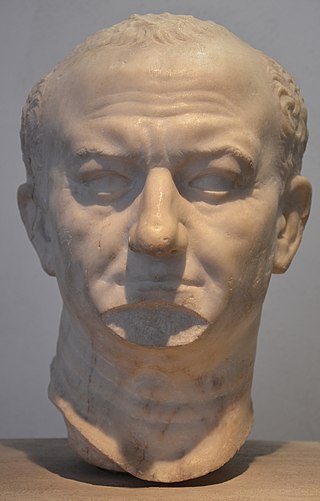
The gens Claudia, sometimes written Clodia, was one of the most prominent patrician houses at ancient Rome. The gens traced its origin to the earliest days of the Roman Republic. The first of the Claudii to obtain the consulship was Appius Claudius Sabinus Regillensis, in 495 BC, and from that time its members frequently held the highest offices of the state, both under the Republic and in imperial times.

The gens Flavia was a plebeian family at ancient Rome. Its members are first mentioned during the last three centuries of the Republic. The first of the Flavii to achieve prominence was Marcus Flavius, tribune of the plebs in 327 and 323 BC; however, no Flavius attained the consulship until Gaius Flavius Fimbria in 104 BC. The gens became illustrious during the first century AD, when the family of the Flavii Sabini claimed the imperial dignity.

The gens Vibia was a plebeian family at ancient Rome. Although individuals named Vibius appear in history during the time of the Second Punic War, no members of this gens are found at Rome until the final century of the Republic. The first of the Vibii to obtain the consulship was Gaius Vibius Pansa in 43 BC, and from then until imperial times the Vibii regularly filled the highest offices of the Roman state. The emperors Trebonianus Gallus and Volusianus each claimed descent from the family.

The gens Antonia was a Roman family of great antiquity, with both patrician and plebeian branches. The first of the gens to achieve prominence was Titus Antonius Merenda, one of the second group of Decemviri called, in 450 BC, to help draft what became the Law of the Twelve Tables. The most prominent member of the gens was Marcus Antonius.
The gens Appia was a plebeian family at Rome. Its nomen, Appius, is a patronymic surname based on the praenomen Appius. The gens does not appear to have been very large, and few of its members achieved great importance.
The gens Septimia was a minor plebeian family at ancient Rome. The gens first appears in history towards the close of the Republic, and they did not achieve much importance until the latter half of the second century, when Lucius Septimius Severus obtained the imperial dignity.
The gens Neratia or Naeratia was a plebeian family at ancient Rome, some of whom subsequently became patricians. The first of the gens to appear in history occur in the time of Augustus, but they did not rise to prominence until the time of Vespasian, when Marcus Neratius Pansa became the first to obtain the consulship. The Neratii married into the Roman imperial family in the fourth century.
Gaius Turranius was a Roman eques who flourished during the reign of the emperors Augustus, and Tiberius. He was appointed to a series of imperial offices, most notably praefectus or governor of Roman Egypt and later praefectus annonae.

Titus Flavius Piso was a Roman eques who held at least two senior postings during the reign of the Emperors Marcus Aurelius and Commodus.
Gaius Tettius Africanus Cassianus Priscus was a Roman eques who held a number of appointments during the reigns of the emperor Vespasian and his sons. Pavis d'Escurac observes that Priscus is the only known eques to hold the ranks of both praefectus vigilum, praefectus annonae ; Priscus was also praefectus or governor of Roman Egypt.
Tiberius Julius Lupus was a member of the equestrian class who was praefectus or governor of Roman Egypt from 71 to 73. He was the older brother of Lucius Julius Ursus; their father was Julius Lupus, the brother-in-law of the praetorian prefect Marcus Arrecinus Clemens and uncle of Arrecina Tertulla, the wife of the emperor Titus. It was this connection that likely enabled Lupus to be appointed to the governorship.
Claudius Julianus was a Roman eques and jurist who held a number of military and civilian positions during the reign of the Emperor Septimius Severus, most importantly praefectus or governor of Roman Egypt. His relationship to other Claudii Juliani is unknown.
Marcus Petronius Honoratus was a Roman eques who held a number of military and civilian positions during the reigns of the Emperors Hadrian and Antoninus Pius, which included praefectus annonae and praefectus or governor of Roman Egypt.

Lucius Julius Vehilius Gratus Julianus was a soldier and an eques who held a number of military and civilian appointments during the reigns of Marcus Aurelius and his son Commodus. Julianus received honors two separate times for his military service.






